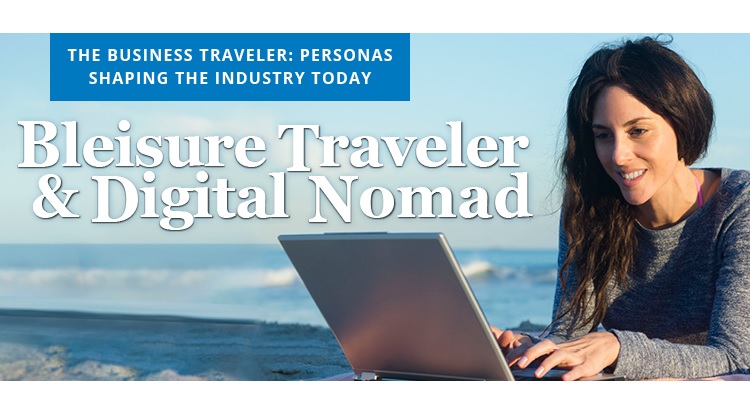As business travel ramps back up, the travel and hospitality industry has started to witness changes. For instance, more business travelers are combining leisure and work trips. While such bleisure travel isn’t new, it has increased post-pandemic. Christiane Cabot Bini, executive director of corporate travel sales at Hilton, says Hilton has seen the average corporate travel stay increase by a day and a half.
“After an elongated period of being cooped up,” says Charuta Fadnis, SVP of research and product strategy at Phocuswright, “travelers are returning in droves.”
Travel across most travel categories started bouncing back once Americans got access to COVID-19 vaccines, according to a 2022 Deloitte Travel Outlook report, and in fact doubled from February to September 2021.
There’s also a big rise in digital nomads, or flexible, hybrid or remote workers traveling with laptops who can work anywhere there’s wifi. More than 50 countries now offer digital nomad visas, allowing extended stays to those who meet certain conditions and want to work remotely.
Phocuswright recognizes two types of digital nomads, according to Fadnis. “Lifestyle nomads” combine remote working with personal travel, while “blended travelers” take more frequent leisure trips and work from their travel destination. Phocuswright considers digital nomads leisure travelers, even though they travel for business and partake in bleisure.
However you categorize them, digital nomads and bleisure travelers are impacting travel in ways being felt across the board.
Airline travel, post-pandemic
The Wall Street Journal found some major airline officials say they don’t tie their airline’s profitability to a return to pre-pandemic business travel levels because digital nomad and bleisure travelers are filling the void.
Yet these types of travelers are also changing some airline flight dynamics. Suzanne Neufang, CEO of Global Business Travel Association (GBTA), points to how some business travelers are now traveling with their families. “Maybe they’re used to getting upgraded and sitting in the front for long distances, but now they’re sitting in the back with their family.” She says airlines must recognize that they may have a high loyalty member sitting in coach.
She says other loyalty customers are paying to upgrade their family, which can be “new territory for other passengers sitting at the front of the plane.” Neufang says airlines may need to find a way to not alienate other passengers when children sitting in business or first class change the dynamic and an overnight flight is no longer quiet.
An International Air Transport Association survey found that travelers’ top concerns for travel post-COVID focus on convenience and simplification.
Hotels, lodging and meeting planner changes
Varun Mehra, a senior consultant for CWT Solutions Group, says, “We have seen hotels jump at the opportunity to become part of this hybrid working culture, offering a host of suites or meeting rooms to allow disparate teams to work and meet, so much so that many have adopted the popular WFH acronym to mean work from hotel, rather than ‘work from home.’”
Mehra says some offer “hot desking” perks, monthly subscription packages that provide access to hotel amenities, restaurant discounts and on-site gym memberships and spa vouchers. Some hotels, he says, have even started searching for new properties in more residential and leisure-focused areas to better suit a remote and blended workforce.
Hilton enhanced its mobile app so guests can customize their experiences.
“Now travelers can filter for a property on the beach,” says Cabot Bini, “or one with an EV charging station, or arrange connecting rooms with family members, for example, ahead of arrival.”
The hotel also added Peleton bikes at every U.S. property to better cater to digital nomad and bleisure travelers.
Neufang points out that many hotel companies removed desks from rooms, meaning guests have to work on the bed. “I think the comfort level of someone working in their room for a long time means they need a chair again and a table they can work at,” she says.
She says meeting planners should remember that more people are traveling with their families and put together lists of what to do before and after a conference or meeting. “Learning about a new destination and what it has to offer is something that business travelers are interested in much more consistently than they were before.”
The future of bleisure and digital nomad travel
Cabot Bini says the changes necessary for digital nomad and bleisure travelers are probably here to stay.
“I think there’s no stopping the power of human connection and the power of travel,” she says, adding that “the genie’s a little out of the bottle now, and travelers and workers love the ability to be flexible.”
Paying attention to the changing customer experience and capturing those travelers means more business and possibly engendering loyalty, says Fadnis, who points out that corporate travelers tend to be loyal to brands. “So a good experience can bring repeat business.”
Read more from SmartBrief:
- Hoteliers look ahead to 2023
- Holiday travel declines as costs rise
- Study predicts rebound of business travel in 2023
- Hotels increase wellness options, amenities for guests
___________________________________________
If you liked this article, sign up for SmartBrief’s monthly Travel & Hospitality marketing update. Access original content, special offers, industry trends and tips for B2B marketers. Sign up today.
